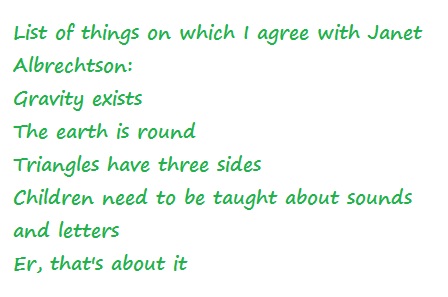Kids get Left Right behind in our literacy debate
0 Replies
One of the leading lights of right-wing thought in Australian politics is Janet Albrechtson, a columnist with the Australian newspaper and proponent of the sort of things with which I fervently disagree, like indefinite detention for asylum seekers, ignoring climate scientists and dismantling the public sector.
So I was quite disturbed to find myself agreeing with an article (2021 update: link no longer available) she wrote in 2009 about literacy education.
She wrote that teachers were not being taught how to teach phonics properly, but should be, and that successive governments – state and federal, Labor and Liberal – hadn’t legislated or invested as they should have, to sort this out, though the NSW government was making a start.
Usually when I hear Janet Albrechtson promote something, I’m immediately suspicious of it, thinking it probably seeks to advance an extremely socially conservative, anti-union, pro-privatisation political agenda.
However, on mature reflection, I suppose there are lots of other things on which Janet Albrechtson and I agree, such as the existence of gravity, the wetness of water and the sameness of the vowel sound in “red”, “head” and “said”.
Having Janet Albrechtson on the pro-phonics team in a political debate, however, is guaranteed to deter politically progressive people from joining the team. Like, for example, most teachers, and teacher union leaders.
Teachers are the main people who must be persuaded of the effectiveness of synthetic phonics if we’re to stamp out illiteracy in Australia like they did in West Dunbartonshire, Scotland.
They could and did do it, so we can and must do it too. Literacy is fundamental to learning at school, and success and wellbeing in later life.
I wish we could take phonics beyond something conservative people tend to support and progressive people tend to treat with suspicion in our media’s literacy debate.
While we’re all arguing about this, many of the 20% of kids who won’t learn literacy well without explicit phonics instruction are missing out, and at least another 30% are not learning as fast or well as they could.
How do we get the effectiveness of synthetic phonics into the same category as the existence of gravity and the wetness of water, where everyone understands and accepts the evidence, and acts accordingly?
The only thing I can think of is to try to get many more parents and teachers and people of all political persuasions to try synthetic phonics out for themselves, understand the research, and push for it to be used more widely, and removed from its politically-charged frame. If Janet Albrechtson and I can agree on something, it’s probably beyond politics.



Leave a Reply